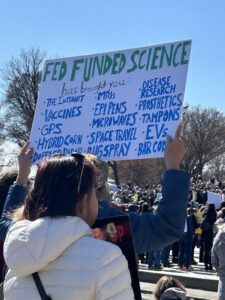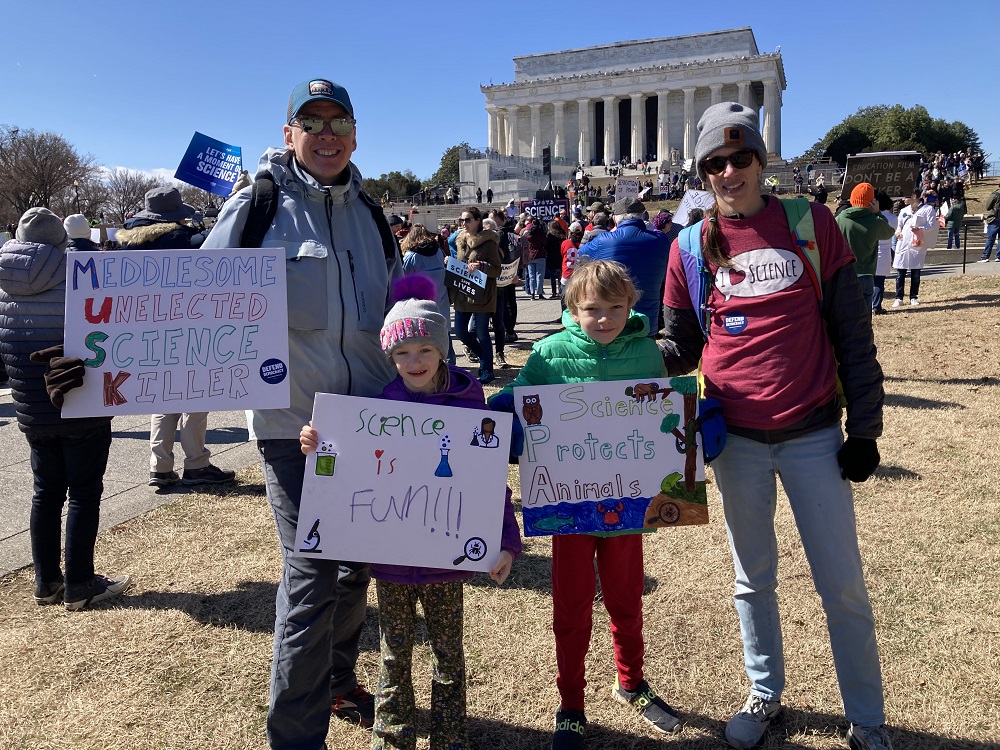Humanists Stand Up for Science in DC

On Friday, March 7th, thousands of science lovers assembled in front of the Lincoln Memorial for a Stand Up for Science rally in response to the Trump administration’s aggressive and irrational firings and budget cuts. I joined humanists from Washington D.C., Maryland, Virginia, and Pennsylvania (representing American Humanist Association groups Northern Virginia Ethical Society and Washington Area Secular Humanists), and shared AHA materials promoting science, reason and climate action. Over thirty rallies took place across the country as well as museum and university walkouts in Europe to “protect scientific research, education, and communication.” Dr. Jonathan Berman, a national co-chair and lead organizer of the 2017 March for Science (in response to Trump’s first term), opened the D.C. rally stressing that we have to vigilantly advocate for science because it’s constantly under attack despite the fact that it teaches us about our world, solves problems, creates jobs and saves lives.
 Speakers addressed recent executive orders and actions that have caused the withdrawal of the United States from the World Health Organization, dismantling of federally-funded research and volunteer projects, firing or threatening of thousands of federal employees, erasure or censorship of many federal resources and endangering the Department of Education. “We know that when science is ignored, censored, tampered with, hit with misinformation and defunded, that people get hurt,” said Dr. Gretchen Goldman, president of the Union of Concerned Scientists.. Former USAID official Dr. Atul Gawande noted that the administration is intentionally spreading lies about diversity, equity and inclusion (DEI) work so they can blame agencies for financial waste:: “Science doesn’t always give the answer that power wants.” He directed attendees to combat their lies by speaking up. “Tell your story in court, tell your story to congress, but above all, tell your story to the people you know…it’s the people who make the difference.”
Speakers addressed recent executive orders and actions that have caused the withdrawal of the United States from the World Health Organization, dismantling of federally-funded research and volunteer projects, firing or threatening of thousands of federal employees, erasure or censorship of many federal resources and endangering the Department of Education. “We know that when science is ignored, censored, tampered with, hit with misinformation and defunded, that people get hurt,” said Dr. Gretchen Goldman, president of the Union of Concerned Scientists.. Former USAID official Dr. Atul Gawande noted that the administration is intentionally spreading lies about diversity, equity and inclusion (DEI) work so they can blame agencies for financial waste:: “Science doesn’t always give the answer that power wants.” He directed attendees to combat their lies by speaking up. “Tell your story in court, tell your story to congress, but above all, tell your story to the people you know…it’s the people who make the difference.”
As the crowd proudly displayed signs explaining how science saved them or someone they love, several speakers shared their stories on stage. College sophomore Emily Whitehead was diagnosed with acute lymphoblastic leukemia at the age of five and, after 22 months of failed chemotherapy, was the first child in the world to receive CAR T-cell therapy. She’s been cancer-free for almost 13 years:
Without funding research that went into developing the treatment that saved my life, I wouldn’t be here today. I stand up for science for all of the other children all over the world who are fighting cancer so they can get back to their childhood outside of the hospital. I stand up for science so kids can grow up to be the next generation of scientists. I stand up for science for underrepresented groups whose voices are not as heard as mine. Every child deserves equal and equitable access to lifesaving treatments, no matter their background, identities, or where they come from.
 From graduate students to professors and former agency heads, to current politicians, speakers shared their research progress, advocacy successes and encouragement for the future. Humanism was well-represented with speeches from Congressional Freethought Caucus co-founder Rep. Jaime Raskin (who got big cheers for separation-of-church-and-state points), 2023 Humanist of the Year and climate scientist Dr. Michael E. Mann, and 2010 Humanist of the Year Bill Nye the Science Guy. Nye reminded us that Article I, Section 8, Clause 8 of the U.S. Constitution gives Congress the power to “promote the progress of science and useful arts” (i.e., engineering) and that we have a right to public access of information because “we paid for this science with our tax dollars.”
From graduate students to professors and former agency heads, to current politicians, speakers shared their research progress, advocacy successes and encouragement for the future. Humanism was well-represented with speeches from Congressional Freethought Caucus co-founder Rep. Jaime Raskin (who got big cheers for separation-of-church-and-state points), 2023 Humanist of the Year and climate scientist Dr. Michael E. Mann, and 2010 Humanist of the Year Bill Nye the Science Guy. Nye reminded us that Article I, Section 8, Clause 8 of the U.S. Constitution gives Congress the power to “promote the progress of science and useful arts” (i.e., engineering) and that we have a right to public access of information because “we paid for this science with our tax dollars.”
Americans have an important responsibility to the rest of our planet to protect education and research–scientific innovation isn’t contained by borders, it connects us all. We need to stand up for science for ourselves, our communities, our planet and futures to come.
